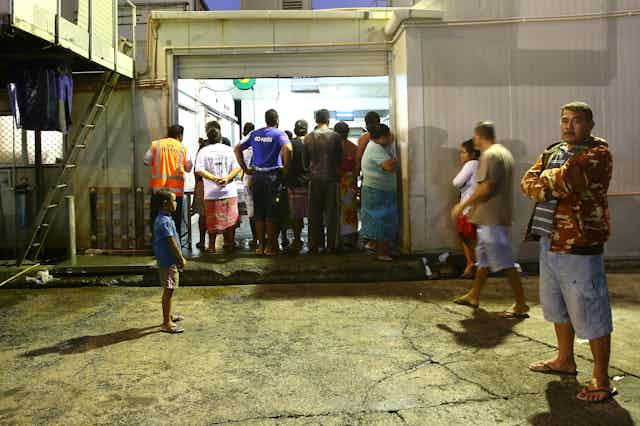The three party leaders currently negotiating to form New Zealand’s next government might have their differences, but they seem to agree on one thing: the Recognised Seasonal Employer (RSE) scheme needs to expand.
New Zealand, like Australia, faces critical labour shortages in some sectors, with real implications for future economic performance. The RSE scheme, which has delivered thousands of crucial workers in viticulture and horticulture since it began in 2007, is the logical solution.
Incoming prime minister Christopher Luxon has pledged to double the RSE intake from the current 19,500. ACT’s David Seymour wants the cap on these workers lifted completely – emulating the Australian approach. And NZ First is in favour of recruiting more migrant workers in all fields facing shortages.
But while an increase in RSE workers might benefit New Zealand, the impact on the Pacific nations they come from is becoming hard to ignore. In fact, the schemes risk undermining the very communities and economies they supposedly benefit.

Intake doubled after COVID
In the year to June 2023, 48,000 people left the Pacific to participate in New Zealand’s RSE scheme and Australia’s Pacific Australia Labour Mobility (PALM) scheme. This represented almost a doubling of visas issued since 2018-19, the last year of recruitment before COVID-19 interrupted things.
Remittance payments from workers in these schemes undoubtedly assisted Pacific countries during the periods of pandemic-related border closures. But the resulting labour shortages in the source countries saw calls for a review of participation in the schemes.
As the table below shows, 20% of the male working-age population in Vanuatu and Tonga were recruited in either the Australian or New Zealand seasonal labour schemes in 2022-23. These are people who will be absent from farms, schools, hospitals, mechanical workshops and other sectors in their home countries for six to nine months of the year.
A recent report from Vanuatu found 60% of enterprises – mostly in trades, retail and restaurants – had been affected by staff losses to RSE and PALM schemes. The tourism sector, in particular, has felt the impact strongly since the PALM scheme expanded to recruit workers beyond the primary sector.
Tourism operators report training staff only to see them leave for more lucrative work on seasonal worker schemes. Taumeasina Island resort in Samoa lost almost 60 workers over the 12 months to February 2023.

Not a win-win policy
The Pacific development policies of both New Zealand and Australia purport to “strengthen resilience” and “grow economies”, devoting millions of dollars to various initiatives.
Arguably, the extraction of increasingly large numbers of skilled and semi-skilled workers from important social and economic sectors is systematically undermining these same initiatives.
The aid money cannot fully compensate for the loss of people from their families, communities, businesses and economic sectors for such extended periods. The Archbishop of Fiji recently spoke about the “dark side of seasonal work”, and it’s clearly no longer tenable to say seasonal labour schemes are the win-win they were originally intended to be.
The balance has tipped in favour of the bigger, richer countries. Earlier this year the OECD reported there is “limited upskilling” of these workers. The anticipated transformative effect on the Pacific private sector has not been seen.
The largest Pacific nation RSE contributors have found this loss of labour is undermining community development as well as the labour market. When workers leave it puts an extra burden on family and communities.
Samoan prime minister Fiame Naomi Mata’afa has been particularly concerned that Pacific countries are perceived as mere “outposts” which “grow” labourers for Australia and New Zealand.
Her sentiments are echoed in Vanuatu, where labour commissioner Murille Maltenoven has spoken of complaints about the “brain drain” affecting the domestic labour market. And Fiji’s prime minister Sitiveni Rabuka argues the local economy should be prioritised over seasonal labour schemes.

Policy and practice must change
The criticism has led both Australia and New Zealand to review and reform their respective seasonal worker policies. Improvements include more investment in pastoral care and skills training, and greater benefits for employees.
It seems unlikely, however, that this will fully address the growing imbalance between who benefits and who bears the cost of these schemes. Furthermore, with Australia expanding its own residency pathway to match New Zealand’s, even more skilled workers may be enticed to leave their Pacific homelands.
Read more: Reaping what we sow: cultural ignorance undermines Australia's recruitment of Pacific Island workers
The Samoan government is tackling the problem head on, approving a new labour mobility policy in late September. Among other things, it will prioritise those who have been unemployed for more than six months.
This reflects the OECD position that unskilled workers must be a priority. Otherwise, the schemes will directly undermine human development in Pacific countries.
Other seasoned observers have suggested New Zealand and Australia begin recruiting more workers from Papua New Guinea and Solomon Islands, rather than further deplete Samoa, Tonga and Vanuatu.
The OECD also urges investment in the private sectors of partner countries to create better job options and wages at home for Pacific workers. This is where Australian and New Zealand development aid policies should now be focused.

